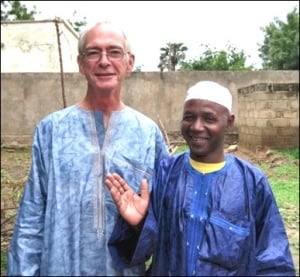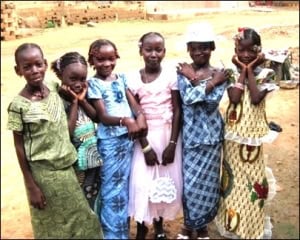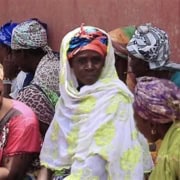A Peace Corps Ramadan: Mali 2011-2013
by David Drury
David Drury and Asifa Kanji served in Peace Corps together while in their 60’s, from 2011 to 2013. David did small business development work, and Asifa did health and nutrition. Their first assignment was in Kayes, western Mali, the hottest continuously-inhabited town in Africa. After 14 months service they had to be evacuated from Mali, due to a coup and invasion, but they went on to do Peace Corps assignments in Ghana and South Africa. This story is adapted from the his-and-her memoir 300 Cups of Tea andThe Toughest Job, by Asifa Kanji and David Drury, 2015
A Peace Corps Ramadan–and Thanksgiving
Ten years ago Asifa and I were serving as Peace Corps volunteers in Mali, West Africa. In that year August was the month of Ramadan, a time of reflection and fasting for Muslims. Although people still go to their regular jobs, they take no food or water from sunup to sundown. At work my colleagues did get a bit sleepy in the afternoons, and the soft drink machine was unplugged for the month, but everyone took it in stride. Growling stomachs and parched mouths notwithstanding, most folks were cheerful and mild. Even the nicotine addicts – of which there are many among Malian men – sighed philosophically and waited for sunset. Allah cooperated with relatively balmy weather that year, but Ramadan is a lunar fast and moves backwards through the calendar year by year. Not so many years from now it will come during the searing 120 degree heat of May, and I wonder how the faithful will cope. As for Asifa and me, we did eat lunch and kept ourselves hydrated, but always in private. No one expected us to fast.
Although the days are austere, the nights of Ramadan have a special cozy feel as families turn inward to break their fast together. It is a time for reading from the Koran or listening to radio preachers, patching up old quarrels, giving to the poor. And like the Christian Lent, Ramadan ends with a joyful bang: the feast of Eid Al Fitr, started by the Prophet himself so they say, not long after his flight from Mecca to Medina to escape assassination.
On Eid day Asifa and I were invited to celebrate with our friend Moussa and his family in Kayes Ndi, a three or four mile walk to the far side of the river in the western Mali town where we lived. We set off mid-morning, dressed in our very finest Malian gear, me awkwardly hiking up my long boubou against the mud and the dust. Got to look respectable, you know. It felt like Easter morning, the streets full of smiling people looking splendid as can be and exchanging jolly greetings with total strangers. How could we resist? We Eid Mubārak!-ed and Aw sambe sambe!-ed our way through the market and across the bridge.

Eid Mubārak!
With Moussa’s family we sat down to a fine festive supper, starring charcoal-roasted mutton and capitaine, a large river fish stuffed with fragrant greens. I must say, it was the best damn meal I ever had in Peace Corps, served up with love and the all-out generosity that is so typically Malian. But feasting isn’t really the point of Eid Al Fitr; in between prayers at the mosque, Moussa took us around with him to call on neighbors and friends, paying his respects, catching up on news of the family, and exchanging blessings special for the day.
May this be our first feast and not our last.
May your life be as solid as an iron bar.
May worms not alter it, nor termites.
May God have pity on the departed.
May God accept our prayers.
Each good wish answered, of course, with a fervent Amina! Amen. Kids, too, had a field day, dressed in their holiday best and going around the neighborhood in small flocks of friends to beg for sweet rice cakes. The grownups give them blessings and a small treat. It reminded me a little of Halloween, maybe, or English wassailing, but less rambunctious.

Dressed in their holiday best
As we headed home from celebrating this second-greatest of Muslim festivals, the strangest thought popped into my mind: Bring Back Lent. “Where did THAT come from?” I asked my brain. Then I thought about it. Of course: Lent is in many ways the Christian Ramadan.
When you strip away the religious trappings, Ramadan and the traditional Christian Lent are really the same idea – a mass spiritual exercise, a time of sacrifice and renewal that the whole community takes part in. Picture a world where, for one month out of the year, everybody you know sets out on that same journey, to take stock of who they truly are and how they treat the people around them, and to rise above the discomforts of hunger and thirst. A month when people are conscious of trying to be good. It’s a discipline many of us in the West have never learned; but, like jogging, it goes better if you do it in company. Islam does it on a global scale.
Christmastime is the closest our culture comes to a mass spiritual exercise, I suppose (not counting Superbowl), but we have turned Christmas into a season of indulgence and not much else, and given up on the austerities of Advent. That’s a pity, because the shared self-sacrifice of a Lent or Advent creates opportunities for soul-searching that just don’t seem to happen when we are too comfortable, or do it alone. We have lost the centuries-old tradition of using the run-up to Christmas and Easter to make ourselves better persons.
So here’s what I was thinking as we walked back over the bridge, bellies and hearts full of Eid cheer: Thanksgiving is the best of our North American holidays. It celebrates no military victories, no revolutions and no particular religion, though it is at home with all religions. How much more joyful would Thanksgiving be if the whole week leading up to it had been set apart by tradition, like Ramadan, as a time of fasting and reflection? And if everybody did it?




This is a wonderful article about David & Asifa’s experiences with Ramadam. Our world could be a better, friendlier place.